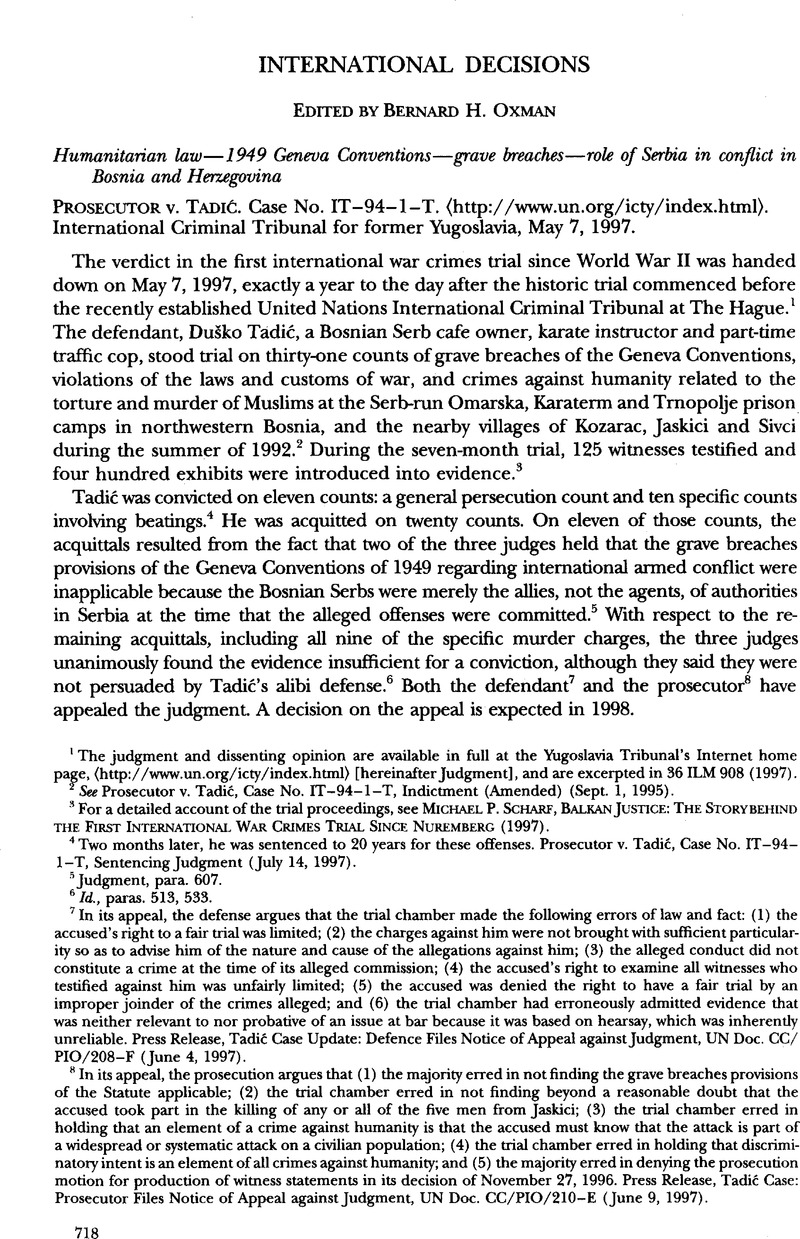Article contents
Prosecutor v. Tadić
Published online by Cambridge University Press: 27 February 2017
Abstract

- Type
- International Decisions
- Information
- Copyright
- Copyright © American Society of International Law 1997
References
1 The judgment and dissenting opinion are available in full at the Yugoslavia Tribunal’s Internet home page, <http://www.un.org/icty/index.html> [hereinafter Judgment], and are excerpted in 36 ILM 908 (1997).
2 See Prosecutor v. Tadić, Case No. IT-94-1-T, Indictment (Amended) (Sept. 1, 1995).
3 For a detailed account of the trial proceedings, see Michael P. Scharf, Balkan Justice: The Story Behind the First International War Crimes Trial Since Nuremberg (1997).
4 Two months later, he was sentenced to 20 years for these offenses. Prosecutor v. Tadić, Case No. IT-94- 1-T, Sentencing Judgment (July 14, 1997).
5 Judgment, para. 607.
6 Id., paras. 513, 533.
7 In its appeal, the defense argues that the trial chamber made the following errors of law and fact: (1) the accused’s right to a fair trial was limited; (2) the charges against him were not brought with sufficient particularity so as to advise him of the nature and cause of the allegations against him; (3) the alleged conduct did not constitute a crime at the time of its alleged commission; (4) the accused’s right to examine all witnesses who testified against him was unfairly limited; (5) the accused was denied the right to have a fair trial by an improper joinder of the crimes alleged; and (6) the trial chamber had erroneously admitted evidence that was neither relevant to nor probative of an issue at bar because it was based on hearsay, which was inherently unreliable. Press Release, Tadić Case Update: Defence Files Notice of Appeal against Judgment, UN Doc. CC/ PIO/208-F (June 4, 1997).
8 In its appeal, the prosecution argues that (1) the majority erred in not finding die grave breaches provisions of the Statute applicable; (2) the trial chamber erred in not finding beyond a reasonable doubt that the accused took part in the killing of any or all of the five men from Jaskici; (3) the trial chamber erred in holding that an element of a crime against humanity is that the accused must know that the attack is part of a widespread or systematic attack on a civilian population; (4) the trial chamber erred in holding that discriminatory intent is an element of all crimes against humanity; and (5) the majority erred in denying the prosecution motion for production of witness statements in its decision of November 27, 1996. Press Release, Tadić Case: Prosecutor Files Notice of Appeal against Judgment, UN Doc. CC/PIO/210-E (June 9, 1997).
9 Judgment, para. 393.
10 In its sentencing judgment, the trial chamber stressed that “ [t]he most serious offense which Duško Tadić individually committed was the killing of two Muslim policemen in Kozarac.” Sentencing Judgment, supra note 4, para. 44. This killing was the basis for Tadić’s 20-year sentence. Id., para. 75.
11 See Scharf, supra note 3, at 143-44, 211.
12 Judgment, para. 393.
13 Id., para. 242.
14 Id.,, para. 238.
15 Jonathan, C. Randal, Serb Convicted of Murders Demanding Retrial After 2 “Victims” Found Alive , Wash. Post, Mar. 15, 1997, at A17 Google Scholar.
16 Geneva Convention Relative to the Protection of Civilian Persons in Time of War, Aug. 12, 1949, Art. 147, 6 UST 3516, 75 UNTS 287.
17 Military and Paramilitary Activities in and against Nicaragua (Nicar. v. U.S.), Merits, 1986 ICJ Rep. 14 (June 27).
18 Id. at 62, para. 109.
19 Judgment, para. 595.
20 Id., para. 598.
21 Prosecutor v. Rajić, Review of Indictment Pursuant to Rule 61, No. IT-95-12-R61, para. 22 (Sept. 13, 1996), summarized in 91 AJIL 523 (1997).
22 Rajić case note, supra note 21, 91 AJIL at 526.
23 The judges assigned to the appeals chamber for the Tadić case are Antonio Cassese, Haopei Li, Elizabeth Odio Benito, Fouad Riad, and Mohamed Shahabuddeen. Press Release, Tadić Case: Update—Revised Composition of the Appeals Chamber, UN Doc. CC/PIO/216-E (June 19, 1997).
24 Judgment, Dissenting Opinion of Judge McDonald, para. 7.
25 Id.
26 Geneva Convention Relative to the Protection of Civilian Persons in Time of War: Commentary 212 (Oscar M. Uhler & Henri Coursier eds., 1958).
- 3
- Cited by


